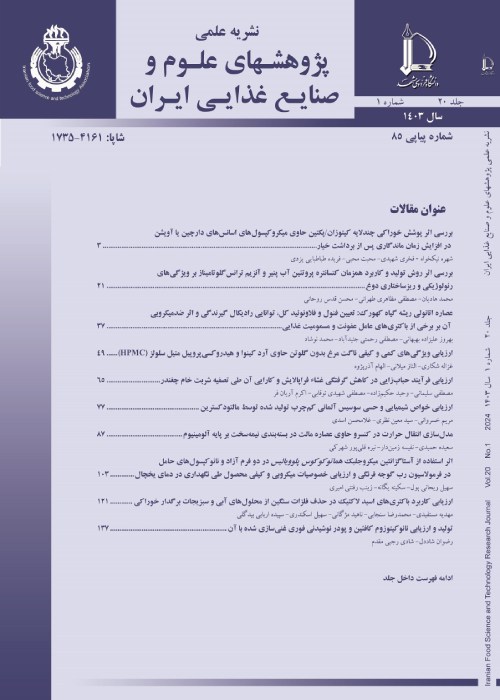The effect of chitosan-whey protein based edible coating containing bionanocomposite material and Zataria multiflora essential oil on UF-Feta type cheese shelf life
Author(s):
Article Type:
Research/Original Article (دارای رتبه معتبر)
Abstract:
Introduction
In recent years, the tendency to use antimicrobial edible film and coating has increased, which has increased the quality, safety and shelf life of food. Cheese is one of the most important dairy products that has a special nutritional value in human nutrition. UF-Feta cheese, which is a type of cheese, is contaminated by microorganisms such as coliforms, spore-forming bacteria and lactose-fermenting yeasts. The causative agent of listeriosis, Listeria monocytogenes, is transmitted through the consumption of cheese. In this study, the effect of composite edible coating based on chitosan and whey protein containing titanium dioxide (TiO2) nanoparticles and Zataria multiflora essential oil on shelf life, microbial, physicochemical and sensory properties of UF-Feta type cheese was investigated. Furthermore, the inhibitory effect of films from coating solutions on the growth of Listeria monocytogenes was also investigated. Materials and Methods
Chitosan, whey protein isolate (WPI) (higher than 91% protein), Zataria multiflora essential oil (ZEO), TiO2 nanoparticles, and glycerol were procured from Bio Basic (Canada), Hilmar Canada, Barij-Essence Co. (Iran), Acros Co. (USA), and Merck Co. (Darmstadt, Germany), respectively. In order to prepare the coatings, a solution of WPI and chitosan was prepared separately. Whey protein suspension (3%, w/v) was made by dispersing WPI in DDW subsequently heated at 90°C for 30 min at pH value of 8.0 and then cooled rapidly. Chitosan solution (10 g/L) was made by dispersing chitosan in 2% (v/v) acetic acid solution with constant mixing for 3 h at 60°C. Based on preliminary experiments, whey protein–chitosan suspension was made using blending two polymer suspensions at constant ratio of WPI/chitosan (70:30) and mixed magnetically for 15 min at 25ºC. In the next step, TiO2 NPs (1 and 2% w/w) were incorporated and after mixing for 15 min, glycerol (30% w/w) was incorporated to the composite suspension and again stirred for 30 min. Next, ZEO (0 and 1% v/v) was incorporated into the composites suspension and sonicated for 30 min with power of 100 W.To produce cheese samples, milk was subjected to bactofogation, pasteurization (76°C for 15 seconds), ultrafiltration and then the retentate was homogenized at a pressure of 70 bars. By adding a starter culture (10 units /1000 L), the pH of the retentate was decreased to 6.2. Then, rennet (0.004 g/ 100 g) and salt (2 g/ 100 kg) were mixed with water and added to the cheese container. Retentate was transferred to a coagulation tunnel at 37 ° C for 30 minutes to form a coagulum. After incubation, the coating solutions were sprayed on the clot using a spray device equipped with a spray gun and packed with aluminum foil. Finally, the samples were stored at 4°C. Samples were subjected to microbiological tests (contaminating microbes and starters), physicochemical (fat, titratable acidity, pH, and moisture content, texture analysis) and sensory evaluation at different ripening periods (3 to 60 days). To evaluate the growth inhibitory of Listeria monocytogenes on the surface of cheese by composite films, pieces of cheese (23× 21× 1.7 mm) were first cut under aseptic conditions and their upper surface was inoculated with 40 μl of Listeria monocytogenes (ATCC19115) until the initial bacterial count was about 3.5 log cfu /g. The composite films placed on the surface of the inoculated cheese and stored at 4°C. Film-inoculated cheese samples were used as a control. Microbial counts were done at intervals of days 0, 3, 8, 11, 14. Data analyzed with SPSS software and means were compared with Duncan multiple range test. Results and Discussion
The results showed that TiO2 NPs and ZEO significantly reduced total bacterial count, lactic acid bacteria and coliforms compared to control with increasing storage period. Mold and yeast colonies also increased considerably over time in the control compared to the nanoparticle-treated samples, while the While in treatments containing ZEO did not grow at all. Physicochemical analysis exhibited that the content of moisture, fat, and pH of all cheeses decreased, acidity and texture hardness increased. Sensory evaluation of UF-Feta cheeses showed that the aroma, taste and overall acceptability of the control and nanoparticle-containing coatings improved compared to the brine-treated cheese. Nevertheless, in the coating samples containing ZEO due to the negative effect of the essential oil on the organoleptic properties of cheese, consumer acceptance was significantly reduced. On the other hand, the use of composite films to inhibit the growth of Listeria monocytogenes on the surface of UF-Feta cheese at 4 °C for 14 days showed that composite films, especially films containing ZEO, had a significant effect on the reduction of the Listeria monocytogenes population. As a conclusion, composite films containing TiO2 NPs and ZEO could be applied in food packaging systems, particularly at the UF-Feta cheese packaging.Keywords:
Language:
Persian
Published:
Iranian Food Science and Technology Research Journal, Volume:17 Issue: 5, 2021
Pages:
729 to 745
magiran.com/p2338103
دانلود و مطالعه متن این مقاله با یکی از روشهای زیر امکان پذیر است:
اشتراک شخصی
با عضویت و پرداخت آنلاین حق اشتراک یکساله به مبلغ 1,390,000ريال میتوانید 70 عنوان مطلب دانلود کنید!
اشتراک سازمانی
به کتابخانه دانشگاه یا محل کار خود پیشنهاد کنید تا اشتراک سازمانی این پایگاه را برای دسترسی نامحدود همه کاربران به متن مطالب تهیه نمایند!
توجه!
- حق عضویت دریافتی صرف حمایت از نشریات عضو و نگهداری، تکمیل و توسعه مگیران میشود.
- پرداخت حق اشتراک و دانلود مقالات اجازه بازنشر آن در سایر رسانههای چاپی و دیجیتال را به کاربر نمیدهد.
دسترسی سراسری کاربران دانشگاه پیام نور!
اعضای هیئت علمی و دانشجویان دانشگاه پیام نور در سراسر کشور، در صورت ثبت نام با ایمیل دانشگاهی، تا پایان فروردین ماه 1403 به مقالات سایت دسترسی خواهند داشت!
In order to view content subscription is required
Personal subscription
Subscribe magiran.com for 70 € euros via PayPal and download 70 articles during a year.
Organization subscription
Please contact us to subscribe your university or library for unlimited access!


